
Protesters against Australian Government plans to censor the Internet in 2008.
Photo by flickrsquared, licenced under Creative Commons.
The Australian government is trying to get more powers to snoop on Internet users. Mark Newton, a network engineer at a large Australian ISP, has attacked, angrily, these plans at New Matilda. He points out the dishonest way law enforcement keeps demanding new powers, the threats to civil liberties, the cost to telcos (and thus their customers), of keeping 2 years’ worth of messages for *every single subscriber*, and the dangerous temptation to steal or leak such valuable information on a large scale.
He’s of course correct on every one of these points. But there’s something missing – it’s rarely mentioned when people talk online about how to deal with these dangerous planned powers. Newton’s final paragraph says:
Before data retention proposals are taken seriously, the law enforcement community should be required to explain, in detail and in public, why the existing measures they’ve demanded every other year since 2001 are insufficient.
which means he’s demanding greater oversight. And that’s where we get to a problem. For a start, we probably won’t get much more oversight except for what Greens Senator Scott Ludlam can extract from public servants in Senate committees. Ludlam does good work on this issue, but he’s not going to have the resources to carry out a wide-ranging investigation of the entire proposal. But even if he had those resources, there’s still a deeper problem: Relying on the government to play by the rules is a terrible idea, and one that leaves us complacent.
There’s a better approach – using the tools that exist, right now, to defend our privacy. There’s a very useful interview with a man who had his Twitter account information seized by the US government at n+1 magazine. The details of the legal procedures used to snoop only apply to the US, but there’s also an explanation of some of the ways we can protect ourselves – sometimes as simple as not taking a mobile phone with you to a highly confidential meeting, because cellphones are “tracking devices that make phone calls”.
We’re almost at the stage where we can use easily-available, simple-to-explain technology to defend our privacy. Small computers the size of a large power plug are already available – they plug into a wall socket and cost a few dollars a year to run. FreedomBox is a project to develop and sell such “plug servers” pre-configured to protect users privacy. Because of the low power cost they can remain on all the time, meaning that instead of keeping all our personal information on Stalkbook’s computers, we’ll use a new type of social network where WE control our private info on OUR computers, and people we give permission to will be able to see it, “like” it, comment on it and so on. Diaspora has been an attempt to do this, but it is difficult to install and does not work very well yet.
We need to swing the Australian debate around to “How can we protect our privacy and take control of our personal information?”, instead of “How can we get the government to respect civil liberties?”. One simple way is to tell people about the n+1 article – it’s good at explaining some of the risks and trade-offs of different types of communication. Surveillance Self-Defence is a great wrap up of the risks and our defence options in some detail at the US Electronic Frontier Foundation website. I hope to write some articles later in the year about my experience minimising my contact with Google – I stopped using my Gmail account and set up my own email server, taking personal control of my email and stretching my computer knowledge while I did it.
Of course, if the government REALLY wants to snoop they’ll be able to. But we have the power to make it much harder for them to do it. Let’s start talking about this and get Australians realising the answer to snooping by our over-reaching, busy-body government is to take power into our own hands.
Thanks to the Australian technology blog Delimiter for pointing me to Newton’s article.





Recent Comments